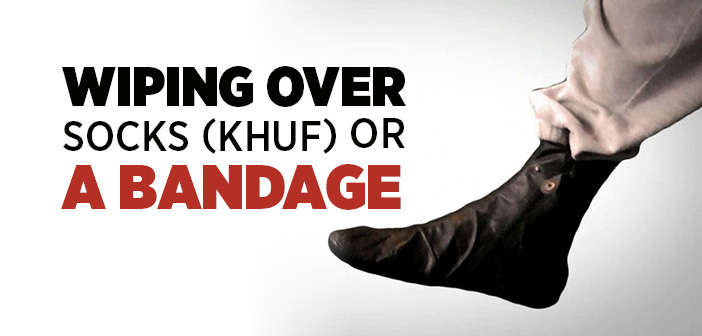What is wiping over socks in islam? What is khuf?
A khuf –or masah- are leather socks that cover the feet and heels and are able to be walked in. Masah also means to wipe (with a wet hand) over a bandage or fabric covering an injured limb or wound.
Islam has always offered ease in times of difficulty. Wiping over a masah or bandage during ablution is an aid of convenience just as tayammum is, in times of hardship.
I. Requirements for wiping over socks (khuf) to be valid
The requirements may be divided into the following groups:
- A) Requirements that need to be met by the khuf socks: There are six:
- It must be made of leather: The outer layer must be made of leather to be able to wipe over them.
- It must be clean,
- It must be sewn,
- It must cover the areas of the feet that are washed during wudu’,
- It must be durable enough to walk in,
- It must not contain anything on it that prevents the water from touching its surface.
B) Requirements that need to be met by the person wearing the khuf socks
- The socks must be worn in a state of purity (having performed wudu’),
- The purification carried out before wearing the socks must be done by water not earth (tayammum),
- The socks must be worn after the completion of wudu’,
- The socks must be worn due to necessity or hardship, not comfort,
- The socks must not be an obstacle for other worship acts, (eg. During ihram, it is prohibited to wear anything on the feet)
II. The way masah is done and its duration of validity
Abdest alırken sıra ayakları yıkamaya gelince abdest alan kişi sağ elini sağ ayağının parmak uçlarına sol elini de sağ ayağının altına doğru koyar ve her iki elini de ayak bileğine kadar sürerek çeker. The left foot is wiped in an opposite manner to the right foot.
Wiping the top surface of the khuf is fard, while wiping the bottom is sunnah. If the top surface is not wiped, the wudu’ is considered invalid. Not wiping any part of the top or bottom of the socks is considered not wiping for the most part.
There is no duration of validity for wiping over khuf socks. A person may wipe over the khufayn for as long as he wants. However it is advised that the person removes his khuf socks at least once a week.
III. Nullifiers of the Masah
There are three things that nullify the masah:
- A circumstance whereby ghusl is required: Such as the occurrence of a state of janabah, menses or post-natal bleeding, in any of these cases the masah becomes invalid.
- If the masah socks are torn: If the size of the tear is roughly equal to a third of the foot, the masah is nullified. If the tear is a size less than a third of the foot, however part of the foot is revealed, the masah is considered nullified, however a tear that is internal does not nullify the masah. Small holes (that do not transfer the water to the interior of the socks when wiped with wet hands) are of no harm.
- Raising most of the foot to the ankle part of the masah
A person who has taken off his masah socks after wiping them during wudu’ must wash his feet immediately. If a person has worn a masah sock over another masah, and has removed the first masah after wiping them, he needs to wipe the remaining masah immediately.
If a person removes one of the masah socks from one of his feet after wiping them, he needs to immediately remove the second one also and wash both feeth.
What is meant by “immediately” is that there should be no long pause between the removal of the socks and the washing of the feet for the wudu’ to be valid. However if there was a long pause in between, the wudu’ is considered invalid and needs to be redone.
During the act of wiping of the socks; washing them or putting in extra effort to wet the curvy surfaces or wiping more than once are all makruh (disliked).
IV. Wiping over a bandage
If there is a wound or injury on any part of the body that is washed during wudu’ or ghusl, and if washing it will inflict harm upon the wound or elongate its recovery process, then washing it is not required; hence it may be wiped.
However, if it is possible to wipe over the limb itself (without the bandage), then in this case wiping over the bandage is not permitted.
If a band-aid is placed on a wound and wiping over it is possible, it should be wiped, if it cannot be wiped, a fabric or bandage that is binded above it should be wiped.
The condition of this masah, is that when limbs are wiped, there should be no harm involved. But if there is any harm inflicted –whether it be small or big- masah cannot be performed, tayammum should be performed. However, if most of the body cannot be washed, and only some limbs (such as hands and feet) may be washed, tayammum is required.
If the bandage has fallen off or removed purposely, and a long period of time has not passed, the person should reinstate the bandage and wipe over it again. If a long time has passed, the wudu’ or ghusl performed by wiping it has become invalid.
If a person’s bandage falls off during prayer, the prayer becomes nullified. If a long period of time has not yet passed, the person may restore the bandage, wipe it the same way as he did before, and perform his prayer from the beginning.
If a person’s wound is fully recovered during prayer, his prayer becomes invalid. If the bandage was on an area that it washed during wudu’, he should wash this area immediately. If it was on an area that is normally wiped such as the head, it should be wiped.
Source: Fiqh1 (According To The Maliki School Of Islamic Law), Erkam Publications





